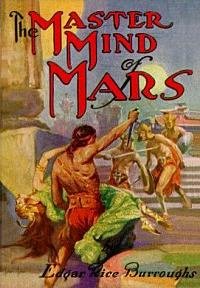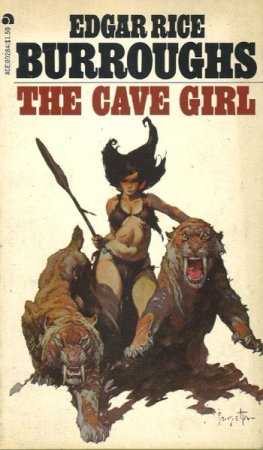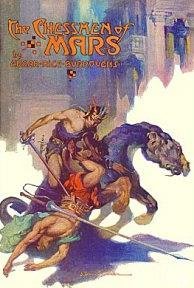Edgar Burroughs - Tarzan and the Jewels of Opar
Here you can read online Edgar Burroughs - Tarzan and the Jewels of Opar full text of the book (entire story) in english for free. Download pdf and epub, get meaning, cover and reviews about this ebook. genre: Adventure. Description of the work, (preface) as well as reviews are available. Best literature library LitArk.com created for fans of good reading and offers a wide selection of genres:
Romance novel
Science fiction
Adventure
Detective
Science
History
Home and family
Prose
Art
Politics
Computer
Non-fiction
Religion
Business
Children
Humor
Choose a favorite category and find really read worthwhile books. Enjoy immersion in the world of imagination, feel the emotions of the characters or learn something new for yourself, make an fascinating discovery.

- Book:Tarzan and the Jewels of Opar
- Author:
- Genre:
- Rating:5 / 5
- Favourites:Add to favourites
- Your mark:
- 100
- 1
- 2
- 3
- 4
- 5
Tarzan and the Jewels of Opar: summary, description and annotation
We offer to read an annotation, description, summary or preface (depends on what the author of the book "Tarzan and the Jewels of Opar" wrote himself). If you haven't found the necessary information about the book — write in the comments, we will try to find it.
Tarzan and the Jewels of Opar — read online for free the complete book (whole text) full work
Below is the text of the book, divided by pages. System saving the place of the last page read, allows you to conveniently read the book "Tarzan and the Jewels of Opar" online for free, without having to search again every time where you left off. Put a bookmark, and you can go to the page where you finished reading at any time.
Font size:
Interval:
Bookmark:
Tarzan and the Jewels of Opar
Edgar Burroughs
1
Belgian and Arab
Lieutenant Albert Werper had only the prestige of the name he had dishonored to thank for his narrow escape from being cashiered. At first he had been humbly thankful, too, that they had sent him to this Godforsaken Congo post instead of court-martialing him, as he had so justly deserved; but now six months of the monotony, the frightful isolation and the loneliness had wrought a change. The young man brooded continually over his fate. His days were filled with morbid self-pity, which eventually engendered in his weak and vacillating mind a hatred for those who had sent him herefor the very men he had at first inwardly thanked for saving him from the ignominy of degradation.
He regretted the gay life of Brussels as he never had regretted the sins which had snatched him from that gayest of capitals, and as the days passed he came to center his resentment upon the representative in Congo land of the authority which had exiled himhis captain and immediate superior.
This officer was a cold, taciturn man, inspiring little love in those directly beneath him, yet respected and feared by the black soldiers of his little command.
Werper was accustomed to sit for hours glaring at his superior as the two sat upon the veranda of their common quarters, smoking their evening cigarets in a silence which neither seemed desirous of breaking.
The senseless hatred of the lieutenant grew at last into a form of mania. The captain's natural taciturnity he distorted into a studied attempt to insult him because of his past shortcomings. He imagined that his superior held him in contempt, and so he chafed and fumed inwardly until one evening his madness became suddenly homicidal. He fingered the butt of the revolver at his hip, his eyes narrowed and his brows contracted. At last he spoke.
You have insulted me for the last time! he cried, springing to his feet. I am an officer and a gentleman, and I shall put up with it no longer without an accounting from you, you pig.
The captain, an expression of surprise upon his features, turned toward his junior. He had seen men before with the jungle madness upon themthe madness of solitude and unrestrained brooding, and perhaps a touch of fever.
He rose and extended his hand to lay it upon the other's shoulder. Quiet words of counsel were upon his lips; but they were never spoken. Werper construed his superior's action into an attempt to close with him.
His revolver was on a level with the captain's heart, and the latter had taken but a step when Werper pulled the trigger. Without a moan the man sank to the rough planking of the veranda, and as he fell the mists that had clouded Werper's brain lifted, so that he saw himself and the deed that he had done in the same light that those who must judge him would see them.
He heard excited exclamations from the quarters of the soldiers and he heard men running in his direction.
They would seize him, and if they didn't kill him they would take him down the Congo to a point where a properly ordered military tribunal would do so just as effectively, though in a more regular manner.
Werper had no desire to die. Never before had he so yearned for life as in this moment that he had so effectively forfeited his right to live. The men were nearing him. What was he to do? He glanced about as though searching for the tangible form of a legitimate excuse for his crime; but he could find only the body of the man he had so causelessly shot down.
In despair, he turned and fled from the oncoming soldiery. Across the compound he ran, his revolver still clutched tightly in his hand. At the gates a sentry halted him. Werper did not pause to parley or to exert the influence of his commissionhe merely raised his weapon and shot down the innocent black. A moment later the fugitive had torn open the gates and vanished into the blackness of the jungle, but not before he had transferred the rifle and ammunition belts of the dead sentry to his own person.
All that night Werper fled farther and farther into the heart of the wilderness. Now and again the voice of a lion brought him to a listening halt; but with cocked and ready rifle he pushed ahead again, more fearful of the human huntsmen in his rear than of the wild carnivora ahead.
Dawn came at last, but still the man plodded on.
All sense of hunger and fatigue were lost in the terrors of contemplated capture. He could think only of escape.
He dared not pause to rest or eat until there was no further danger from pursuit, and so he staggered on until at last he fell and could rise no more. How long he had fled he did not know, or try to know. When he could flee no longer the knowledge that he had reached his limit was hidden from him in the unconsciousness of utter exhaustion.
And thus it was that Achmet Zek, the Arab, found him.
Achmet's followers were for running a spear through the body of their hereditary enemy; but Achmet would have it otherwise. First he would question the Belgian.
It were easier to question a man first and kill him afterward, than kill him first and then question him.
So he had Lieutenant Albert Werper carried to his own tent, and there slaves administered wine and food in small quantities until at last the prisoner regained consciousness. As he opened his eyes he saw the faces of strange black men about him, and just outside the tent the figure of an Arab. Nowhere was the uniform of his soldiers to be seen.
The Arab turned and seeing the open eyes of the prisoner upon him, entered the tent.
I am Achmet Zek, he announced. Who are you, and what were you doing in my country? Where are your soldiers?
Achmet Zek! Werper's eyes went wide, and his heart sank. He was in the clutches of the most notorious of cut-throatsa hater of all Europeans, especially those who wore the uniform of Belgium . For years the military forces of Belgian Congo had waged a fruitless war upon this man and his followersa war in which quarter had never been asked nor expected by either side.
But presently in the very hatred of the man for Belgians, Werper saw a faint ray of hope for himself.
He, too, was an outcast and an outlaw. So far, at least, they possessed a common interest, and Werper decided to play upon it for all that it might yield.
I have heard of you, he replied, and was searching for you. My people have turned against me. I hate them. Even now their soldiers are searching for me, to kill me. I knew that you would protect me from them, for you, too, hate them. In return I will take service with you. I am a trained soldier. I can fight, and your enemies are my enemies.
Achmet Zek eyed the European in silence. In his mind he revolved many thoughts, chief among which was that the unbeliever lied. Of course there was the chance that he did not lie, and if he told the truth then his proposition was one well worthy of consideration, since fighting men were never over plentifulespecially white men with the training and knowledge of military matters that a European officer must possess.
Achmet Zek scowled and Werper's heart sank; but Werper did not know Achmet Zek, who was quite apt to scowl where another would smile, and smile where another would scowl.
And if you have lied to me, said Achmet Zek, I will kill you at any time. What return, other than your life, do you expect for your services?
My keep only, at first, replied Werper. Later, if I am worth more, we can easily reach an understanding. Werper's only desire at the moment was to preserve his life. And so the agreement was reached and Lieutenant Albert Werper became a member of the ivory and slave raiding band of the notorious Achmet Zek.
For months the renegade Belgian rode with the savage raider. He fought with a savage abandon, and a vicious cruelty fully equal to that of his fellow desperadoes.
Font size:
Interval:
Bookmark:
Similar books «Tarzan and the Jewels of Opar»
Look at similar books to Tarzan and the Jewels of Opar. We have selected literature similar in name and meaning in the hope of providing readers with more options to find new, interesting, not yet read works.
Discussion, reviews of the book Tarzan and the Jewels of Opar and just readers' own opinions. Leave your comments, write what you think about the work, its meaning or the main characters. Specify what exactly you liked and what you didn't like, and why you think so.






